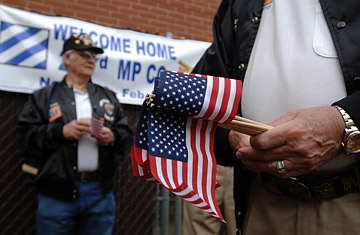
Bob Wolford and members of the Vietnam Veterans of America give out small American flags before a homecoming ceremony for the U.S. Army's 293rd Military Police Company Fort Stewart, Georgia.
Bill Rider knows the look. The hollow, unfocused eyes, the sharp jawline formed from teeth pressed together like they're bound by cement, the pinned-back shoulders whose titanium stiffness mask sadness and fear. Rider knows the look because he possessed it after he returned from Vietnam. Now 63, he spent many years after that war sleeping with weapons by his side, seeking satisfaction in mindless sexual conquests, pursuing danger as an undercover narcotics detective. It took him 30 years to recognize that his emotional numbness and hypervigilance were wounds, deep war injuries that needed to be and could be healed. And he doesn't want America's 800,000 new veterans returning from Iraq and Afghanistan to have to go through the same dark wandering in the wilderness.
Rider and a handful of other Vietnam veterans in La Jolla, Calif., founded American Combat Veterans of War (ACVOW) shortly after Sept. 11, 2001, as a support group for those who had seen combat during their lives — or were about to in the war in Afghanistan. Thousands across the country joined the organization, but on March 20, 2003, when President Bush deployed the first U.S. troops to Iraq, the Vietnam vets who ran ACVOW knew the group would have a new, vital role. Says Rider: "We knew what it was like to be imprinted negatively by war, and we felt we had to use ourselves as a paradigm for future veterans of what not to be and what not to do."
The plight of returning soldiers is dire, based on testimony before the House of Representatives. A Department of Veterans Affairs e-mail indicated that 1,000 veterans each month attempt suicide; of the 300,000 veterans of the wars in Iraq and Afghanistan who have sought medical care through the VA system, about 60,000 have been given a preliminary diagnosis of post-traumatic stress disorder (PTSD); a new Rand study found that 1 in 5 soldiers suffers from PTSD or major depression. While the VA has some programs in place, the rising rates of suicide, homelessness and violence among veterans is propelling groups like ACVOW forward. The Vietnam warriors believe they possess what the government can't offer: insight and genuine empathy, some of the most valuable resources for the psychologically wounded.
Though it doesn't receive government funding, ACVOW is recognized by the VA and the Department of Defense, and in 2006 the Marine Corps asked Rider and his team to provide PTSD debriefings for San Diego–area Marines returning from the Middle East. The meetings began in November 2007, and ACVOW started hosting weekly outreach meetings. Rider joined forces with Nico Marcolongo, 37, a former Marine intelligence officer who knew that peer support and the wisdom of older veterans could be a valuable combination. Marcolongo himself is recovering from debilitating depression; he spent six months in bed after returning from his second stint in Iraq in 2006, and during that time, he became so disconnected that his then 3-year-old son told his wife Lisa, "Daddy's still in Iraq."
